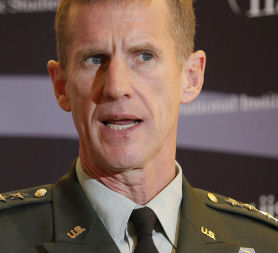Background: General Stanley McChrystal
Updated on 02 December 2009
Earlier this year the head of the US and Nato forces said that more soldiers on the ground were crucial to success in Afghanistan. Here are the details behind General Stanley McChrystal.

General Stanley McChrystal was installed as America's military commander in Afghanistan earlier this year and is the commander of the International Security Assistance Force (ISAF) - a US and Nato alliance formed by the United Nations Security Council.
McChrystal, who is reportedly admired by US President Barack Obama, was chosen for his forward-thinking and modern asymmetric war fighting tactics. As a military leader he has stepped away from the conventional military planning side and his experience in the special forces is seen also as advantageous.
His position in Afghanistan makes him one of the most senior military leaders in Washington.
He recently called on Obama to deploy 40,000 extra men to Afghanistan in order to secure territory and train Afghan forces. He claimed that if more troops are not deployed, the conflict in Afghanistan "will likely result in failure".
The announcement of 30,000 troops falls short of what the general says he needs on the ground although he has welcomed the decision.
"The Afghanistan-Pakistan review led by the President has provided me with a clear military mission and the resources to accomplish our task," he said in statement.
Military career
A graduate from the military academy of West Point, McChrystal served in the 75th Ranger Regiment in Saudi Arabia during the first Gulf War in 1991.
In 2001 to 2002 he was appointed chief of staff of operations in Afghanistan.
At the beginning of the Iraq war in March 2003, he was serving in the Pentagon as a member of the Joint Staff.
His most high profile success was the killing of Abu Musab al-Zarqawi - al-Qaida's leader in Iraq. Al-Zarqawi was seen as a major threat to western forces in Iraq from 2003 as he masterminded high profile kidnappings, beheadings and numerous road-side and suicide bomb attacks.
McChrystal's role as forward commander of the Joint Special Operations Command gave him the success which impressed high profile figures although his career has not been without criticism.
In 2007 a Pentagon investigation into the accidental shooting of Corporal Pat Tillman in 2004 by army rangers in Afghanistan held General McChrystal accountable for inaccurate information provided by Corporal Tillman's unit in recommending him for a Silver Star. The false information suggested Corporal Tillman had been killed by enemy fire.
Afghan warning
McChrystal's request for extra troops is reminiscent to his predecessor, General David McKiernan. He rose to prominence in 2003 as leader of the coalition forces and US conventional ground forces during the invasion of Iraq.
Following the invasion, he put pressure on George Bush's administration to provide more troops on the ground. He said he wanted more troops than the US leaders were prepared to free up. His conventional tactics were seen as ideal for taking Baghdad in a limited period of time - although the aftermath of the Iraq conflict was not seen as successful.
McChrystal's new Afghan strategy draws heavily on lessons learned from the Iraq military surge - which Obama opposed.
The key to the Afghan strategy is training a reliable home-grown army and police force - an area where Bush tactics failed. The strategy focuses on pairing newly-deployed American soldiers with specific Afghan units which will then be trained. The long term aim is to hand over provincial power to the country's forces.
Sucess "not inevitable"
McChrystal gave a stark warning about the Afghan war in October. He used his first speech in the UK to warn that the insurgency is growing and that success cannot be taken for granted.
"The situation is serious - and I choose that word very, very, carefully," he said.
"I also say that neither success nor failure for our endeavour their in support of the Afghan people and the government can be taken for granted.
"My assessment, my best military judgement as I'd term it, is that the situation is in some ways deteriorating."
He went on to say that success in Afghanistan depended on the Afghanis themselves:
"I'm trying to change the way ISAF forces operate to understand that at the end of the day we don’t win by destroying the Taliban.
"We don’t win by body count; we don’t win by the number of successfully military raids or attacks. We win when the people decide we win."




